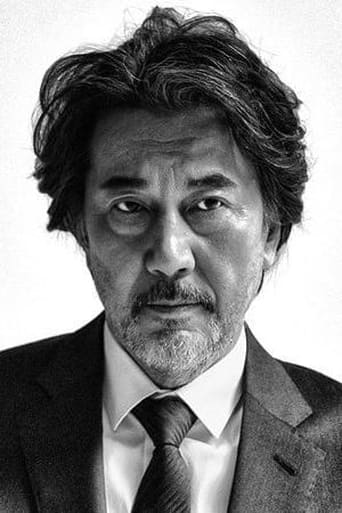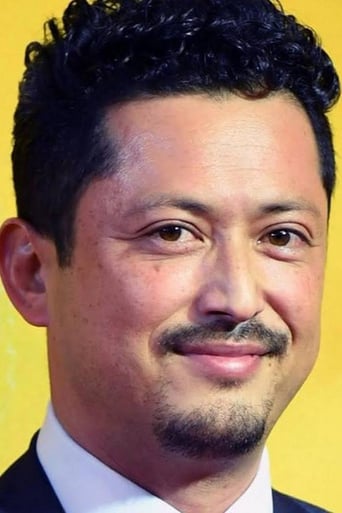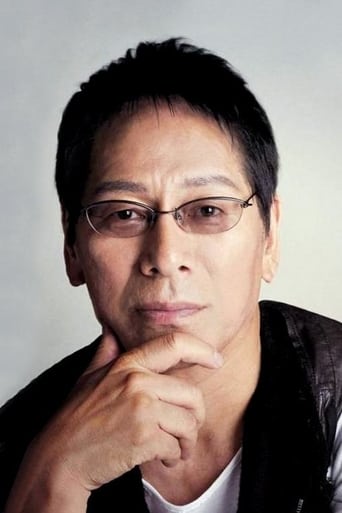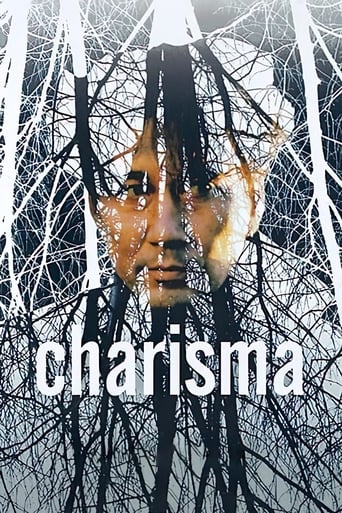
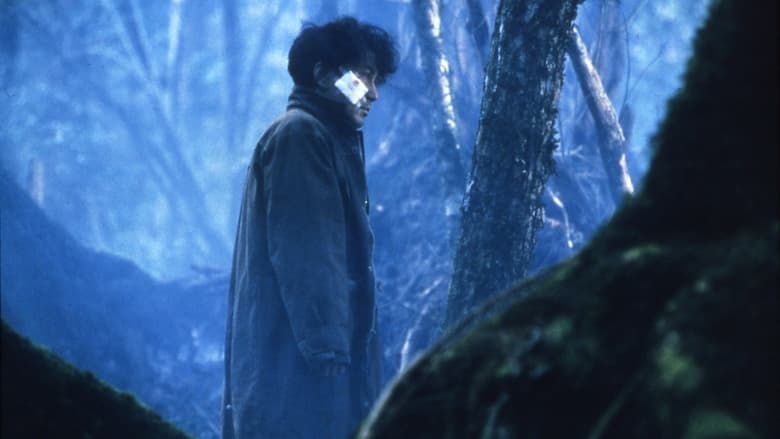
Charisma (1999)
A seasoned detective is called in to rescue a politician held hostage by a lunatic. In a brief moment of uncertainty, he misses the chance for action. Leaving his job and family without explanation, he makes his way to a mountain forest, encountering a peculiar tree called Charisma.
Watch Trailer
Cast


Reviews
So much average
I like movies that are aware of what they are selling... without [any] greater aspirations than to make people laugh and that's it.
If the ambition is to provide two hours of instantly forgettable, popcorn-munching escapism, it succeeds.
This is a small, humorous movie in some ways, but it has a huge heart. What a nice experience.
Kiyoshi Kurosawa has had his duds. "Guard from the Underground" (1992) was mediocre at best, "Bright Future" (2003) was pretentious, and "Eyes of the Spider" (1998) was dreadfully boring. The first time I sat down and watched "Charisma" (1999) I had written it off as another Kiyoshi dud, but a future rewatch proved that it's likely his third best film – behind "Cure" (1997) and "Kairo" (2001).The key to enjoying this film is to recognize its two primary themes: individualism and false dichotomies. The value of the individual is contrasted with the needs of society as a whole, and the false dichotomy is the illusion that one must choose between one or the other. Kiyoshi communicates these ideas through symbolism. The tree named Charisma represents the individual human being, while the surrounding ecosystem represents society as a whole. The false dichotomy presents itself when each character is forced to choose between protecting Charisma or the surrounding ecosystem. Without recognizing these symbols, it is impossible for the viewer to appreciate the entertaining content of this film.One of the more interesting characters is the lady botanist. She previously studied individual plants, but claims that she learned nothing from them. She believes that most people are led astray when they look at the individual plants without observing the forest as a whole. This panoramic outlook is fueled when the ecosystem suffers a gradual decline. The botanist claims that the Charisma tree is poisoning the ecosystem and must be destroyed to preserve the surrounding environment. The cop asks her if there's a way for both to survive, but she says that it is impossible. However, it is divulged later on that the botanist herself is accelerating the destruction of the environment by dumping large quantities of poison into a nearby well. Her logic is that a quick death and restoration is a better option than the slow, gradual decline that Charisma is currently inflicting. This must be a very painful decision coming from a character that values the needs of the many over the needs of the few.The tree's guardian takes more of a natural selection angle, that the dominant individual should rightly survive irregardless of the consequences. He needs force to protect the Charisma tree, which is why he wants to persuade the cop to join his side. When the guardian makes reference to the "rules of the forest", the viewer will correctly remember that the kidnapper in the opening scene made reference to "the rules of the world", and since this movie uses the forest as a symbol for the human world, we now understand that both characters share the same essential outlook. You see, the "rules of the world" represent the false dichotomy of choosing between the individual and society. The world maintains order by forcing people to make this decision and blinding them from recognizing that a third option does indeed exist. The guardian seems to subconsciously recognize this third option, but his obsession with Charisma (aka the individual) prevents him from realizing it.This is where Koji Yakusho's character comes into play. He is the "swing vote" of sorts because his status as a policeman gives him the power of authority. However, he seemingly plays both sides, first opting to protect the first Charisma tree and then opting to destroy the second Charisma tree. To confuse matters he also destroys the botanist's poison well. Why does he act so erratically? Because he believes that both Charisma (aka the individual) and the forest (aka society) need to survive. For him the problem is the way the question is posed. Rules and force attempt to establish a false dichotomy that allows for only two wrong choices instead of the correct third option. Therefore, he chooses to help one Charisma and kill another, switching sides to keep the balance between the two forces. This film comes full circle on this theme near the end. The cop redeems his earlier mistake at the beginning of the film (getting both the kidnapper and hostage killed) by saving the botanist near the end without killing the kidnapper, another symbolic representation of avoiding a false dichotomy (of choosing one or another) by saving both.The policeman's refusal to play by the "rules of the forest" causes chaos on a local level, which is first depicted by the sledgehammer killings in the small town and then by the tree guardian's murder of the botanist's assistant. In addition, the men in black (initially hired to retrieve the first Charisma for its apparent monetary value) turn on the local environmentalists and kill them. Even more striking is that these men in black turn down a briefcase full of money and refuse to give the tree guardian a ride (a complete deconstruction of their previous personas that valued money above all else). And since the events within the forest act as a microcosm of the whole world, this local chaos manifests into a worldwide pandemonium. The policeman walks out of the forest to witness the nearby city in flames. His decision to rebel against the rules of the forest has now resulted in the deconstruction of the rules of the world.This is a very well-written movie that is consistent and efficient in its structure. Viewers with an attraction to odd, quirky, deliberately paced art-house films should love this. The environments are also beautiful and moody, and the chilly weather makes this film essential viewing during the late autumn months. A truly great film with more creativity and imagination than a dozen others combined.
***SPOILERS*** In Kiyoshi Kurosawa's CURE, in which the director examines both the quicksilver nature of truth as well as "the transient nature of one's true self," actor Koji Yakusho was "Mesmerising." He's no less watchable, here, in CHARISMA (which he has, in abundance: he's this Kurosawa's equivalent to Akira Kurosawa's Toshiro Mifune, if such a parallel can be drawn). Kurosawa once again demonstrates his mastery of superbly subtle surrealism. CHARISMA also reminds one of ACACIA, another borderline fantasy fright film. Kurosawa is clearly comfortable bending genres. (Not that he's incapable of straightforward narrative: in SEANCE, the medium herself is the message and BRIGHT FUTURE is nothing if not a "mainstream" movie. Only exceptionally well done.) Like 3-IRON, CHARISMA is a subtle, mature and "haunting" experience.
Karisma (Charisma) directed by Kiyoshi KurosawaThe thing 'Karisma (Charisma)' impressed me the most is how the director Kiyoshi Kurosawa delivered this psychological/philosophical story with a calculated manner. When Goro Yabuike, a detective from Tokyo, lost his way in an isolated and peculiar community in a countryside, he started getting involved with different groups of people who were disputing over this one tree they called 'Karisma (Charisma).' The tree was imported from outside of the country by the director of the asylum who passed away, and later the community learned that the tree was actually poisoning all other trees and grass around it for its solo survival. They argued whether they should protect the tree, which was destroying the woods, or they should get rid of the poisonous tree to save the woods. The 'Karisma' tree becomes a medium of their communication, and Yabuike, the outsider, suddenly got a position to play the God to make the decision. Kiyoshi Kurosawa is trying to show a conception of nature in the film. The answer the detective Yabuike suggests is that the chaos over the 'Karisma' is based on human's selfish interest and not the natural order. The director Kiyoshi Kurosawa mathematically composed "the rule of a game" in a fictional story setting. 'Karisma (Charisma)' is a very interesting psychological and philosophical film.
I absolutely loved this film. I saw it in Rome as a part of a Japanese Film Festival at the Japanese Consulate? or Cultural center? and it has now become one of, if not my favorite, Japanese films I've ever seen (and I've seen quite a few). So strange, very difficult to follow but all the same very interesting and engaging. It was shot well and at times I remember it being pretty intense. The story revolves around a Tree and those people around it who want the tree (Added to the confusion of the plot, I saw it a couple years ago, so my memory fails me). I have not seen any of Kiyoshi Kurasawa's other films but I'm going to try. I would recommend this film to anyone who likes Japanese films and the discussions that follow watching them. If anyone knows where I can get a copy of this, or see it again please let me know. I would love a copy of this one.


